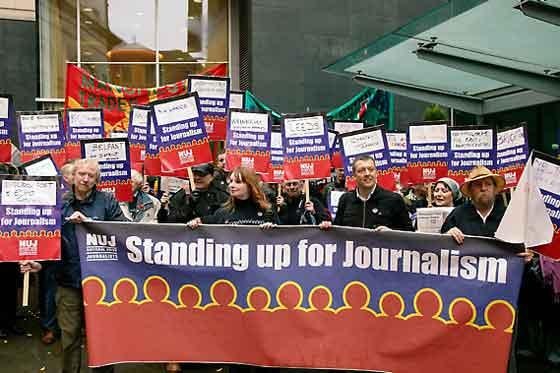
Monday 5 November
Wake up at 6.30am in a strange bed. I’m in Cardiff to launch the NUJ‘s Stand Up for Journalism day of action.
I hotfoot it across to the National Assembly for a breakfast meeting hosted by heritage minister Rhodri Glyn Thomas. We cover BBC job cuts, ITV‘s plans to ditch more public service broadcasting commitments and Trinity Mirror‘s unhealthy domination of the local newspaper market.
We secure a commitment about involving the union in developing a communications policy for Wales. I dash to the station to catch my train to Manchester. I use the time to do interviews and catch up on activities happening across the industry as NUJ members highlight concerns about budget cuts, staffing shortages and quality being compromised. It is the biggest-ever Europe-wide day of action.
It’s a typical Manchester November day: sideways rain and cold. I fear that will mean few turn out for the lobby of the Society of Editors conference. My fears are wiped away when I turn the corner to be greeted by a forest of placards – up to 200 NUJ members representing workplaces across the UK brave the elements to send a clear message to editors and owners – stop the cuts, defend quality journalism.
A short march to the conference venue. Security panic. The editors descend the stairs, having been warned to be on the lookout for the ‘enemy within’by the head of MI5. Suddenly there we are, massed outside the hotel entrance. Most editors scuttle away for a slap-up lunch, but one brave soul comes out to tell us how much he supports our stand. I had offered to address the editors’ conference but they turned us down, so instead I use the megaphone to ensure they can’t avoid our message. I do a couple of quick interviews before heading to address our lunchtime rally.
Then it’s another high-speed dash to another railway station – I’ve got to address a rally in London. Update my blog (https://jeremydear. blogspot.com/) and catch up on dozens of events taking place.
Twelve hours after waking up in Cardiff I address my third meeting of the day, alongside Tony Benn and Newsnight presenter Paul Mason, as 150 NUJ activists pledge their commitment to ensure today is only the start of the Stand Up for Journalism campaign.
It’s 11pm – and my final job is to cart the placards back to NUJ HQ before heading home.
Tuesday 6 November
No rest for the wicked. After a couple of staff meetings, the day is dominated by talks at ACAS – 14 hours of them.The dispute at The Guardian is complex – a move to 24/7 integrated working involves lots of changes and negotiating them for hundreds of staff takes time. We start at 11am. At 7.30pm we order in curry, at 9pm someone goes to get chocolate cake from Sainsbury’s. At 1am, after 14 hours of talks, we adjourn.
Wednesday 7 November
I take off my ‘militant trade union leader’cap and don my management one. In the morning I face union officials representing NUJ staff to present an update on the union’s pension scheme and plans to solve the funding shortfall, then a discussion with staff on how we can further reduce the union’s carbon footprint. New plans are hatched. Then it’s coffee with Evening Standard new media correspondent Amar Singh – and a chance to brief him about issues coming up.
I finally get a night off – and head to the Camden Roundhouse to see Ojos de Brujo, a fantastic band from Barcelona.
Thursday 8 November
Among a host of meetings, it’s back to The Guardian where the NUJ committee endorses the stance taken by the negotiating team – and agree we should give ACAS one more go before balloting for strike action. I also fire off a letter to the Pakistan High Commission after yet more reports of attacks on journalists and a clampdown on the media.
Friday 9 November
On Friday morning I film an interview to be shown at The First Casualty: The War, Truth and the Media conference about the coverage of Iraq and Afghanistan and the dangers facing journalists.
I then start ploughing through almost 1,000 emails and letters.
Saturday 10 November
I address the union’s first conference of refugee and asylum-seeker members forced to flee for seeking out the truth. Journalists from a dozen countries are represented – I’m proud our union was the first to change its rules to enable journalists forced in to exile to enjoy the benefits of union membership.
Email pged@pressgazette.co.uk to point out mistakes, provide story tips or send in a letter for publication on our "Letters Page" blog
